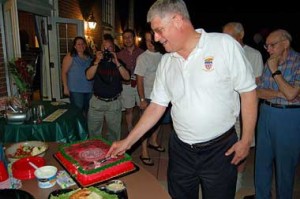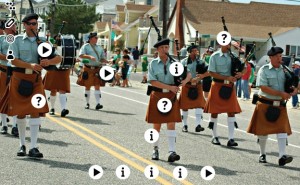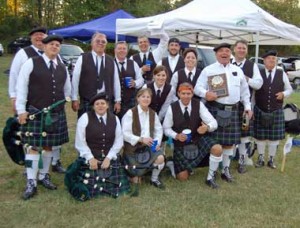
Cutting the cake.
Phil Townsend grew up in Gladwyne, next door to St. Christopher’s Church, where the old Main Line Pipe Band used to practice.
He first heard the band perform at the church’s Azalea Day Fair. From that moment, he was hopelessly addicted to the bagpipes. “I’ve loved them since the very first time I heard them play,” he says. With the sounds emanating from the church hall week after week, it was perhaps inevitable that Townsend would join the band—first, at age 8, as a drummer, and then, at 10, as a piper.
From that point on, almost nothing could keep him away, as one of Phil’s favorite stories will attest:
“One night I was struggling with mathematics, and there was the pipe band playing in the church building,” he says. “I was grounded until I had completed my homework assignment. But finally it was too much for me, and I jumped out the second-floor window, fell onto a trash can—amazingly, I was unhurt—and then ran off to band practice. That should tell you the effect bagpipes have on me.”
And if you’re still not persuaded that bagpipes have a singular hold on Phil Townsend, consider this: On his wedding day—he was living in Utah and playing with the Salt Lake Scots—he married his “infinitely understanding and tolerant” sweetheart Molly in the morning and piped in a parade that afternoon, he says, “with my new bride marching alongside the band.”
Almost 50 years after he succumbed to the siren song of the drones, he’s still devoted to this finicky instrument. He has played in and led (as pipe major) several Delaware Valley bands, including the old Clan na Gael, Washington Memorial, Philadelphia Emerald and Ulster Scottish. He has performed with countless other bands, on pipes or drums—and sometimes both. He also instructed the Lia Fail Band in Hightstown, N.J.
Somewhere along the line, Townsend also became acquainted with a competition pipe band in Killen, County Tyrone, just across the border from Donegal in the Republic. He has piped with that band for several years—unfortunately, not including 2002, when Killen won the World Championships in its grade level (4A).
Just a few days after Independence Day in the States, Phil and Molly took up residence in Castlederg, County Tyrone. Townsend once again will pipe with Killen, and he’ll compete in the Worlds on Glasgow Green. But this time, he hopes Ireland will become his and Molly’s year-round home. For, as great as Phil’s love for the pipes, it just might be exceeded by his love of Ireland.
* * * * *
Recently, Phil’s many friends in Washington Memorial Pipe Band gathered at the band’s practice hall at Valley Forge Military Academy to wish him a fond farewell. Old mates from other bands, including Main Line and Emerald, joined in the festivities. They all clustered around a big fold-out map of Ireland to get a sense of where he and Molly are setting up house. They shared memories. They shared cake—with a tartan frosting, of course. And at the end, the band circled up and blasted through “Scotland the Brave,” “The Rowan Tree” and many of the old tunes, with Phil tapping away on snare drum.
It was also a bittersweet leave-taking in another sense. For the past 33 years, Valley Forge Military Academy has been the focal point of Col. Phil Townsend’s professional life—first, as cadet and, subsequently, as tactical officer, teacher, librarian, director of student activities and, finally, dean of the academy.
The next step in Townsend’s career will be to take his degree in library science from Villanova and apply his skills as a cataloguer at the Omagh Center for Migration Studies, part of the Ulster American Folk Park, also in Tyrone.
It has taken a bit longer than he might have hoped, but Townsend has always known that his life would lead him to Ireland. There were too many profound influences early in life to leave any doubt of that.
“My earliest experiences were with teachers from the North of Ireland, including Hughie Stewart, who founded the Main Line Pipe Band,” Phil recalls. “There was also a woman who was like my second mother, Sarah McGlade, from Castlewellan in County Down, one of the strong influences in my life. She helped raise me, you might say. The first time I went to Ireland I stayed with Sarah’s sister, Agnes Gorman, in a little town called Ballyward in County Down. That was when I was in my early 20s.”
At the time, Townsend was enrolled in the Reserve Officers Training Corps as a result of classes he had taken at VFMC, so he had to return to the United States to fulfill that obligation.
”I had always intended to return to Ireland after I had fulfilled that next obligation,” he says.
Things didn’t work out that way, of course, but now, he says, seems like a good time.
““Certainly, my plan has always been to retire there. But my decision to pull up stakes here and make that move more permanently was of a recent origin,” he says. “I realized that, now, with the economy and developments in the North, now was as good a time as any to purchase some property and a house. We’ve been going back every summer to Castlederg. My intention is to spend at least a portion of every year in Castlederg with the eventual goal of spending year-round there.”
He has children all over the map, too, and visiting them is also part of the plan.
Not long ago, he notes, moving to Castlederg might have been very nearly unthinkable. Because of the town’s close proximity to the Republic on three sides, it was the scene of many violent incidents. IRA bombers and gunmen could sail into Castlederg, do their business, and beat a quick retreat back into Donegal. Townsend notes that Castlederg is reputed to be “the most bombed small town in Northern Ireland.”
But times are changing, as Townsend notes. “For so long, and certainly throughout the ‘80s, Ireland experienced a 14-15 percent unemployment rate. It was not a very promising place to be, notwithstanding ‘The Quiet Man’ and all the stories of going back to Ireland. Now, within the last 10 to15 years, especially with peace so close at hand, there’s a lot more reason for people to stay where they are, or to go back.”
A few years ago, Phil and Molly purchased a bit of land and a duplex near the town center.
Not surprisingly, he looks forward to his new beginning.
“We have our own driveway and a little garden in the front, and there’s a patio and a wee yard in the back,” he says. “Go out the front door of the house walk two minutes and you’ll be at a library in the center of the village. You can sit and read the newspaper in the living room and have a pipe band arbitrarily marching through town—that’s a fairly common occurrence.”
Of course, Castlederg is very close to Killen. In fact, he says, the region is “lousy with pipe bands”—10 of them within a 20-mile radius.
Heaven? Well, not for everyone, he says. But for this passionate piper, life in Castlederg might be as close to heaven as it is likely to get.





